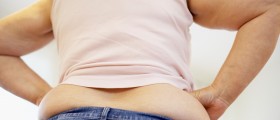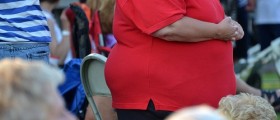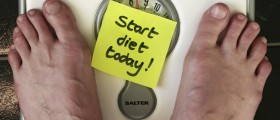Obesity
Obesity is the state of being incredibly overweight and it is the number one nutritional problem in America. However, it does not only affect adult, there are more and more obese babies and children each year.Babies who have obese parents have an 80 percent chance of being obese themselves.

Causes of obesity
Obesity occurs when a person takes in more calories than the body uses.
There are many causes, including the babies diet and lifestyle. In some rare cases, hormonal disorders can lead to obesity a well.
Overfeeding is generally the most common cause. Providing high calorie beverages to children, giving them food in order to solve problems and make them behave, feeding them to relieve stress or to reward them, not proving enough chances for the baby to exercise, all these things can lead to a baby becoming obese.
A family history of obesity, abnormal eating patterns and the use of corticosteroid drugs are some other causes of obesity in children.
Diagnosis
Obesity is fairly easy to diagnose, and the doctor simply needs to check the baby’s height and weight and then plot them out on a growth chart that will show how the child compares to other children in the same age range.
Most infants and toddlers are chubby, but a baby is considered obese the weight gain is proportionately a lot greater than the increase in the height of the baby.
If the body mass index is 30 or higher, the baby is definitely obese and the doctor will be recommending a treatment plan in such a case.
Treatment for Obesity in Babies
The treatment for obesity in babies is to slow the rate of weight gain. However, it is important not to reduce the child’s food intake in order to make them lose weight without talking to a doctor first.
The most important treatment method is to prevent further weight gain through healthy eating habits.
Newborns need to be nursed whenever they are hungry, which is usually in between eight and 12 times a day. However, if the child is bottle-feeding, it should not have around-the-clock access to the bottle.
- The highest prevalence rates of obesity were observed in Spain (17.7%), Malta (17.2%) and Italy (16.8%).
- A wide between-country disparity in breastfeeding prevalence was found. Tajikistan had the highest percentage of children that were breastfed for ?6 months (94.4%) and exclusively breastfed for ?6 months (73.3%).
- In France, Ireland and Malta, only around 1 in 4 children was breastfed for ?6 months. Italy and Malta showed the highest prevalence of obesity among children who have never been breastfed (21.2%), followed by Spain (21.0%).
- The pooled analysis showed that, compared to children who were breastfed for at least 6 months, the odds of being obese were higher among children never breastfed or breastfed for a shorter period.
- Higher birth weight was associated with a higher risk of being overweight, which was reported in 11 out of the 22 countries.
- Bulgaria, Croatia, France, Italy, Poland and Romania showed that children who were preterm at birth had higher odds of being obese, compared to children who were full-term babies.
It is also important not to rush the infant’s feeding time, and it takes 15 to 20 minutes for the baby to feel comfortably full.
Children should also not be eating sweets until they are 12 months old.
It is also important not to use food as a reward for children, or as a method of controlling their behavior. In situation such as this, children use the food as a stress reliever, which is a very unhealthy habit that could lead to obesity in children that will be hard to cure even as they get older.

















Your thoughts on this
Loading...